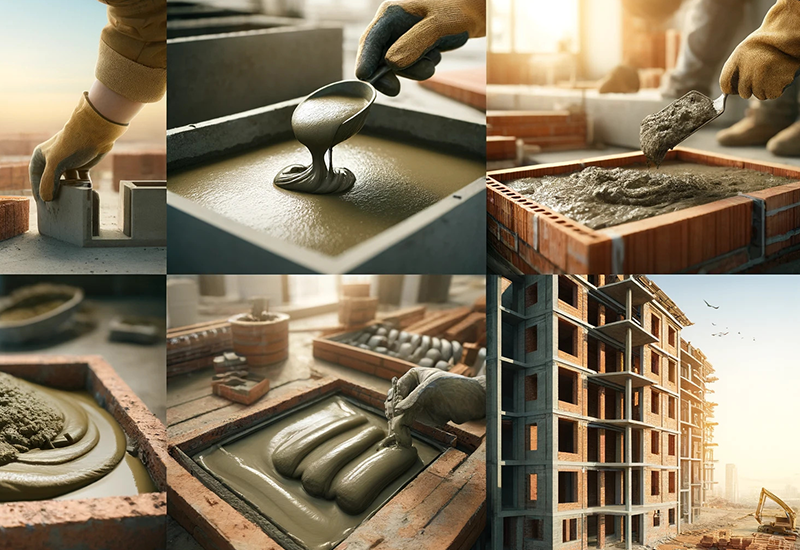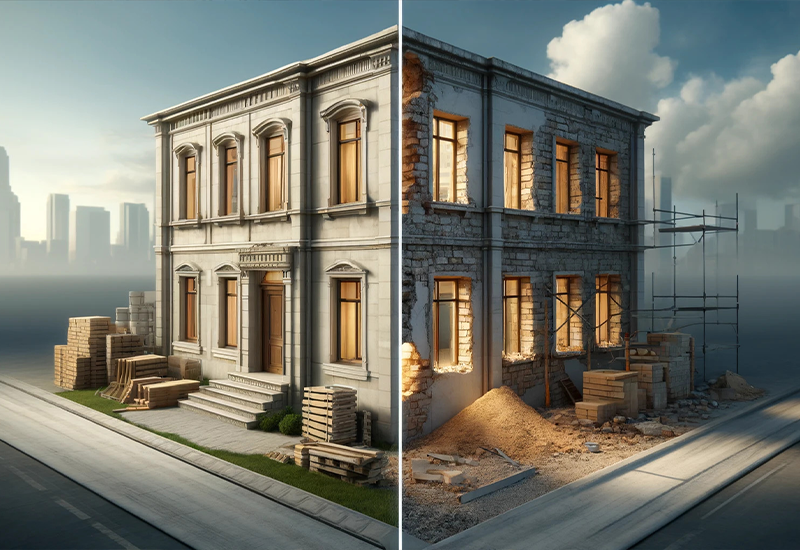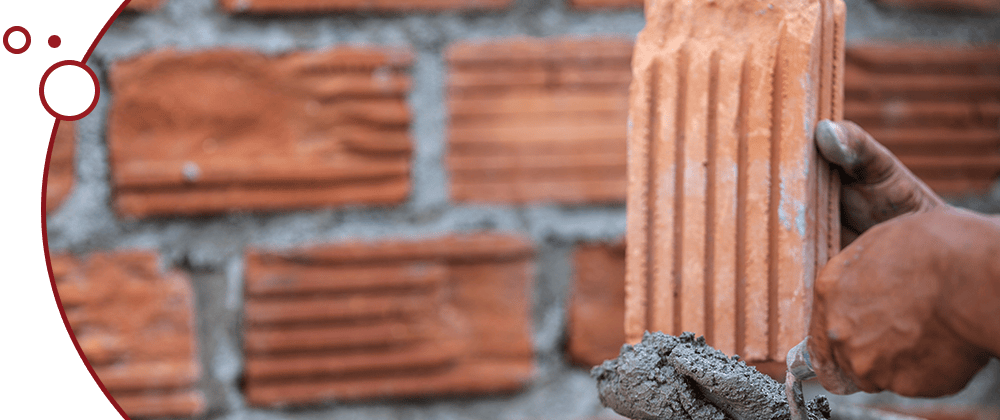
Understanding the different types of brick mortar is essential for any construction or repair job. Mortar serves as the bonding agent that holds bricks together, providing structural integrity and affecting the longevity of the structure. Each type of mortar is formulated to meet specific environmental and structural needs, ensuring that the right type is used for the right job, thereby enhancing the durability and functionality of the masonry work.
Table of Contents
What is Brick Mortar?
Brick mortar is essentially the glue that holds a masonry project together. It’s a blend of binding materials like cement or lime, mixed with sand and water. This concoction not only fills the gaps between bricks but also plays a pivotal role in the structure’s integrity. Depending on what the project demands in terms of strength, flexibility, and resistance to the elements, the composition of the mortar can vary significantly.
Types of Brick Mortar
Understanding the different types of mortar is key to selecting the right one, tailored to environmental conditions and load requirements. Each type is uniquely formulated to offer distinct benefits and is suitable for various applications.
1. Type N Mortar
- Composition: Type N is a medium-strength mortar, which is quite versatile. It typically contains one part Portland cement, one part lime, and six parts sand, achieving a compressive strength of about 750 psi.
- Applications: This mortar is your all-rounder for general masonry projects. It’s perfect for exterior walls, above-ground structures, and soft stone masonry, providing sufficient strength and flexibility for most residential buildings.
2. Type S Mortar
- Composition: With a strength of 1800 psi, Type S is a robust choice. It’s made with two parts Portland cement, one part lime, and nine parts sand.
- Applications: When you’re dealing with structural applications that demand high durability, Type S is the way to go. It’s ideal for foundations, retaining walls, and other critical structures that require enhanced compressive and tensile strength to withstand environmental pressures.
3. Type M Mortar
- Composition: For the highest strength requirements, Type M stands out with a formidable 2500 psi. This mix comprises three parts Portland cement, one part lime, and twelve parts sand.
- Applications: It’s the preferred choice for heavy-duty applications, including foundations, retaining walls, and driveways where loads are significant, and stability is non-negotiable.
4. Type O Mortar
- Composition: This is a low-strength mortar, with a rating of 350 psi, suitable for less demanding installations. It includes one part Portland cement, two parts lime, and nine parts sand.
- Applications: Type O is best suited for interior non-load-bearing walls or for restoration work, including repointing where structural strength is not the primary concern. It’s excellent for renovations within older buildings where the mortar needs to bond with existing, potentially weaker masonry.
5. Type K Mortar
- Composition: At the lower end of the strength spectrum, Type K mortar has just 75 psi. It’s a specialized mix, often used in historical preservation to prevent damage to ancient stones and bricks.
- Applications: If you’re restoring historical buildings, Type K is your go-to. It’s designed to be gentle on heritage masonry units that are typically much softer than modern materials, thus ensuring that the structural integrity of vintage constructions is respectfully preserved.
Choosing the right type of mortar involves considering several factors such as the structural requirements, environmental exposure, and the type of bricks used. With the right match, your masonry work will not only meet the required standards but will also last through the ages, marrying durability with aesthetic appeal.
Choosing the Right Type of Mortar
When it comes to selecting the right mortar for your masonry project, you’ve got to consider several factors to ensure the structure stands strong and durable over time. Let’s explore how to choose the perfect mortar based on the specific needs of your project.
Environmental Exposure
One of the first things to think about is the environment where the structure will exist. Will the mortar face freezing temperatures, excessive moisture, or perhaps a lot of heat? Different types of mortar perform differently under various environmental conditions. For example, mortars with high cement content, like Type M and S, are often more resistant to harsh weather conditions, making them suitable for outdoor and below-grade structures. Conversely, for indoor or protected areas where weather is less of an issue, a less robust mortar like Type O might be entirely adequate.
Structural Load
The load that the mortar needs to support is critical in determining which type to use. If you’re working on a structure that bears a significant amount of weight, such as a retaining wall or a foundation, you’ll need a mortar with high compressive strength, like Type M or S. These are designed to handle heavier loads and provide the necessary support. For non-load-bearing walls or for cosmetic touch-ups, you can opt for Type O or K, which offer sufficient bonding without the high strength properties, thus preserving the integrity of softer or older masonry units.
Compatibility with Brick
Matching the mortar to the brick’s physical and thermal characteristics is also essential. The expansion and contraction of mortar and brick materials must be compatible to avoid cracking. Type N is often a good choice for general applications because it provides a balance between flexibility and strength, accommodating a variety of brick types. For historic restoration, a softer mortar like Type K is preferable as it matches the softer, historic bricks and prevents damage to the original masonry work.
Understanding these factors and how they interact with your specific project will guide you in selecting the right mortar, ensuring your masonry work is not only visually pleasing but also structurally sound and built to last. Always consider the specific requirements of your project and consult with professionals if in doubt, to make the most informed decision for your construction needs.
Advantages of Proper Mortar Selection

Selecting the right type of mortar isn’t just a technical decision—it’s a choice that impacts the longevity, beauty, and cost-effectiveness of your building project. Let’s explore these advantages in more detail.
Durability
Choosing the correct mortar significantly enhances the longevity and durability of masonry work. A well-matched mortar will bond effectively with the bricks, resisting weathering, and environmental stresses. For instance, using a high-strength mortar like Type S in foundations and retaining walls ensures that these structures can withstand the pressures and loads exerted upon them. This means less cracking, fewer repairs, and a longer lifespan for your structure.
Aesthetic Quality
Mortar also plays a crucial role in the overall look of a building. The right type can provide a clean and finished appearance that enhances the bricks’ natural beauty. Mortar lines that are consistent and well-filled contribute to the masonry’s aesthetic appeal, making everything look tidy and well-constructed. Whether you’re aiming for a striking modern look with sharp lines or a traditional feel with softer edges, choosing the right mortar can make all the difference.
Cost-Effective
Opting for the appropriate mortar type can also be highly cost-effective. It reduces the need for frequent repairs and maintenance, saving money in the long run. For example, choosing a more flexible mortar for thermal expansion and contraction can prevent damage from seasonal changes. This proactive approach in selecting the right mortar means you’ll spend less on upkeep as the structure will be better equipped to handle its environmental and structural challenges.
By taking into account these factors, you ensure that your masonry work is not only visually appealing and sturdy but also a wise investment that stands the test of time. Remember, while it might be tempting to go with a one-size-fits-all solution, the unique conditions of your project will dictate the best mortar type to use, resulting in a more successful and satisfying build.
Conclusion
Choosing the correct type of brick mortar is crucial for ensuring the structural soundness and longevity of your construction projects. If you’re seeking professional guidance or need expert services for brick face repair, don’t hesitate to reach out to a seasoned contractor. You can contact them at +(1) 917-477-9667 for reliable and skilled assistance tailored to your needs.
FAQs
Q: What are the main types of brick mortar used in construction?
A: The main types of brick mortar include Type N, S, M, O, and K. Each type is tailored to different structural requirements and environmental conditions, ensuring optimal performance and durability.
Q: How do I choose the right type of brick mortar for my project?
A: Selecting the right type of brick mortar involves considering the structural load, the environmental conditions, and the type of bricks used. Type S and M work well for high-load areas, while Type N and O suit less strenuous applications.
Q: Can the wrong type of brick mortar affect the integrity of a building?
A: Yes, using the incorrect type of brick mortar can compromise a building’s integrity. It’s crucial to match the mortar’s strength and flexibility with the building’s requirements. This avoids issues like cracking and water ingress.
Q: Are there specialized types of brick mortar for historical buildings?
A: Indeed, manufacturers specifically design Type K as a type of brick mortar for historical buildings. Its lower strength ensures that the mortar’s rigidity does not damage the softer masonry materials used in older buildings.
Q: What type of brick mortar is best for outdoor conditions?
A: Experts recommend types of brick mortar like Type S or M for outdoor conditions. Their higher strength and resistance to weather make them ideal for external walls and foundations.


